

Govnerment after shock. Épisode 6 - Leading Questions podcast: candid insights into civil service leadership. Senior civil servants share their leadership stories.
Récit de son rôle comme porteur de changement dans l'intro de la transformation digitale d'une organisation – savoirspublics
Credit: Mark Bowley Episode 7: Adjusting your leadership to the grain of the organisation – Baroness Minouche Shafik “You have to flex your leadership and you don’t really know how to do that until you’ve really understood the culture of the organisation.”
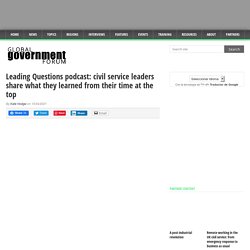
Minouche Shafik was the youngest ever vice president of the World Bank. In 2008, she became permanent secretary of the Department for International Development, before moving to the International Monetary Fund as deputy managing director in 2011 only to find her new boss engulfed in scandal. JRC Publications Repository. Skip navigation An official website of the European UnionAn official EU website How do you know?
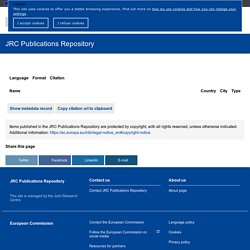
All official European Union website addresses are in the europa.eu domain. Experience employe numerique. Webinaire de KPMG et ServiceNow.
Voir à la 9e min / 11 min / 16 min et 19 min pour le rôle des gestionnaires et chefs d'équipe. À partir de la 28e min, c'est centré sur les employés. – savoirspublics
Bulletin RH Évolution - juillet 2021.
On y parle notamment de comment le RH analytique peut permettre de créer un récit et du sens à une vision (première capsule). – savoirspublics
Strategic human resources competency framework.
Compétence Data and metrics savy : utiliser l'information et les données issues de l'analytique RH pour permettre à l'organisation d'agir stratégiquement. – savoirspublics
Government Powered by Data — A FedScoop Special Report. Data is the lifeblood of the modern federal enterprise.
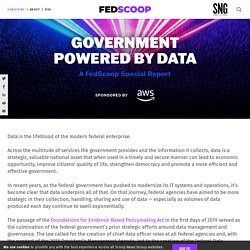
Across the multitude of services the government provides and the information it collects, data is a strategic, valuable national asset that when used in a timely and secure manner can lead to economic opportunity, improve citizens’ quality of life, strengthen democracy and promote a more efficient and effective government. In recent years, as the federal government has pushed to modernize its IT systems and operations, it’s become clear that data underpins all of that. On that journey, federal agencies have aimed to be more strategic in their collection, handling, sharing and use of data — especially as volumes of data produced each day continue to swell exponentially.
The passage of the Foundations for Evidence-Based Policymaking Act in the first days of 2019 served as the culmination of the federal government’s prior strategic efforts around data management and governance. Education Department is getting 'smarter' about hiring, training data scientists. Written by Dave Nyczepir Jul 16, 2021 | FEDSCOOP The Department of Education is crafting its first data-focused workforce plan with an emphasis on the professional development of both data professionals and general staff, according to Deputy Chief Data Officer for Analytics Sharon Boivin.
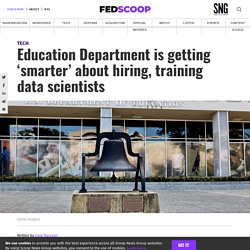
The Office of the CDO — established just under two years ago in response to the Foundations for Evidence-Based Policymaking Act — is supporting other parts of the department by creating standard position descriptions for data professionals and career ladders for data scientists. OCDO had to staff up fairly quickly and hired several master’s- and PhD-level data scientists, some straight out of school or with industry experience, under the Office of Personnel Management‘s 1530 statistics series last year.
The office will continue to leverage such governmentwide opportunities, Boivin said. “We’ve gotten smarter in what we ask for in vacancy announcements,” Boivin said during a Data Coalition event Thursday. Dataset demands and remote leadership among top challenges for CDOs during pandemic. Written by John Hewitt Jones Aug 17, 2021 | FEDSCOOP The volume of demands for coronavirus-related datasets and communicating with staff in a remote environment were among the biggest challenges faced by chief data officers during the pandemic, C-suite advisers told FedScoop.
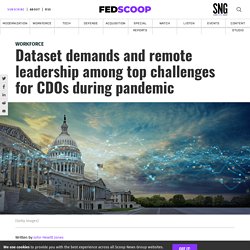
According to consultants and nonprofits canvassed, the responsibilities of CDOs expanded as the COVID-19 pandemic spread across the U.S. during early 2020, to include leading the flexible use of previously untapped data and working to establish a culture in which experimental data dashboards were used to help coordinate teleworking staff. RH Évolution - mai 2021.
Ou optimiser par la technologie? – savoirspublics
Gestion de projet.
Suggestion d'outil via cette plateforme du gouvernement fédéral pour optimiser la collaboration grâce à la technologie – savoirspublics
Réunions virtuelles. Comment fonctionne notre procédure de recrutement.
Tests en ligne et entretien vidéo : optimiser le processus de recrutement – savoirspublics
Brent Council UK - RPA Use Cases in Government. Robotic Process Automation.Now part of the culture at Brent.
Optimisation de plusieurs processus grâce au RPA (Robotic process automation) – savoirspublics
When Brent Council launched its first three-year digital transformation plan in 2017, Robotic Process Automation (RPA) was not included.
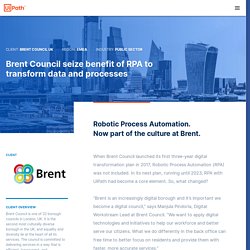
In its next plan, running until 2023, RPA with UiPath had become a core element. So, what changed? “Brent is an increasingly digital borough and it’s important we become a digital council,” says Manjula Pindoria, Digital Workstream Lead at Brent Council. “We want to apply digital technologies and initiatives to help our workforce and better serve our citizens. Government agencies harness RPA ‘bots’ to build capacity, improve services. Written by FedScoop Staff Mar 15, 2021 | FEDSCOOP Federal and state government workers are beginning to benefit from a growing army of digital robots designed to streamline agency workloads and quicken the delivery of public services.
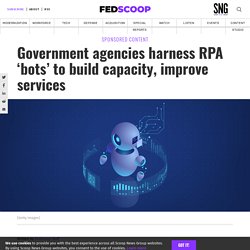
The robots — or more accurately, robotic process automation (RPA) applications — are gaining widening adoption across government agencies, according to a new survey of federal and state government business, program and IT officials. More than 6 in 10 federal respondents — and 4 in 10 state respondents — in the survey said their agency now uses RPA technology to facilitate work. And it appears the momentum for using RPA technology is building quickly in government. Of those at agencies putting RPA to work, two-thirds have begun piloting, or deploying RPA within the last 12 months.
Beyond Cost: How Robotic Process Automation is About to Transform UK Government. It’s estimated that Robotic Process Automation (RPA) could save the United Kingdom (UK) National Health Service (NHS) over £495 million each year.
Ici aussi optimisation des processus grâce au RPA, mais ne nous aide pas à dire aux gestionnaires ce qu'ils peuvent faire concrètement à part attendre que le TI débarque avec leur technologie... – savoirspublics
The cost and service improvement benefits of automating the rules-based, repetitive tasks that underpin many public sector processes make RPA impossible to ignore.
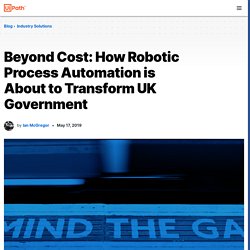
All public sector organizations are being asked to do more with less. Budgets are being squeezed but no one can afford for service levels or citizen engagement to drop. Robots lend government a helping hand - Civil Service Quarterly. Popular culture typically takes futuristic ideas to an extreme.
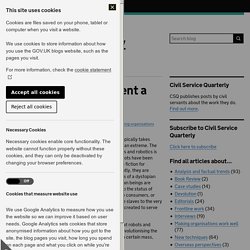
The depiction of robots and robotics is no exception. Robots have been staples of science fiction for decades. DI Government trends 2021. Meet ARNOLD - the first robot in government communications - Civil Service Quarterly. Back in the 1980s, everyone thought that by now we would all have robots like R2-D2 and C3PO working diligently at our sides.
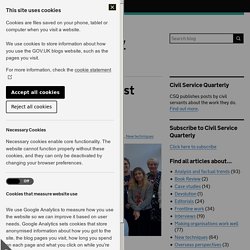
While that has not quite turned out to be the case for most, here in the DfE comms team we recently welcomed the Government Communication Service’s (GCS) very first robot. Now, ‘Automated Robot Negating the Onerous Logging of Data’, or ARNOLD to its friends, doesn’t look like the robots we all imagined. It is actually a computer programme, but it is having a massive impact on how quickly and effectively we are able to communicate with the public and address their concerns. Effective, responsive communications and engagement with the public and taxpayers has to be at the heart of all public service. The search for a new approach to managing these contacts has focused on using technology to improve the accuracy with which they are handled so that they can be responded to in a timely and appropriate way. Metrics that Matter — Code for America. Afua Bruce: Thank you so much for that introduction.
I am so excited to be here today with these panelists really talking about data that is available in government systems and how we can use it to measure what matters. Let’s start at the simplest level. Lynn, I’ll start with you. Achilles heels: research highlights gaps in remote working security – Government & civil service news. Photo by freepik.com The civil service’s wholesale shift to remote working has been a real success for both employers and staff, according to new research. But the survey of nearly 1000 UK civil servants also identifies some blind spots in departments’ work to guard against acquisitive online crime The pandemic-inspired rush to mass remote working has created fertile ground for a number of industries, and none more so than cybercrime. The scramble to get millions of workers set up for home working in the spring of 2020 created huge opportunities for cyber criminals and state-backed hackers looking to exploit vulnerabilities in networks, servers and endpoints.
In the last year, the FBI, Interpol and the UK’s National Cyber Security Centre (NCSC, part of GCHQ) all reported big spikes in the prevalence of cyber attacks. Cybersecurity and Infrastructure Security Agency: Actions Needed to Ensure Organizational Changes Result in More Effective Cybersecurity for Our Nation. Zero Trust: Evolving Government Cybersecurity — A FedScoop Special Report.
In the age of the cloud, cybersecurity can no longer be defined by the perimeter of a network. This has become more apparent than ever as millions of federal workers were sent home last March when the coronavirus and the need to socially distance forced mass telework across the government, with much of the workforce still working remotely today.
In such a model, with personnel logging into applications from remote locations and without the ability to physically identify a user on a network is that person, zero trust is a must. A zero-trust security architecture is one that users on a network are not trusted by default and instead required to provide credentials and earn authorization, typically with continuous validation, anytime they move around a network. It’s a concept that’s catching on across the federal government. Nadya Bartol: Better cybersecurity starts with honesty and accountability. Making the Digital, Data and Technology Capability Framework more user friendly - Digital people. In 2017 we published the Digital, Data and Technology (DDaT) Profession Capability Framework, designed to help improve consistency across DDaT job roles in government.
Ou pour Module 2 - Expérience-employé – savoirspublics
(Read about the creation of the DDaT Capability Framework). It sets out a common language to describe roles and defines the skills needed for each. Creating the UK government’s accessibility empathy lab. Across the UK Government accessibility should be a part of everything we make and we design. Our sixth design principle reflects its importance - “accessible design is good design”. We want to make sure there are no barriers preventing someone from using something. However, user research conducted in 2016 showed that we could improve awareness of accessibility and assistive technologies. How usability testing can improve Toronto’s shelter… Water from a stone: User research in government… Designing For, With, or By? Building Equity Across the Social Sector — Code for America. How we used Speculative Design to foster innovation and collaboration. Researching with communities in a Pandemic. Navigating red tape, barriers and hard places in…
Dissenssus et consensus en éducation : mieux comprendre pour mieux avancer. DEFRA - UK. Navigating red tape, barriers and hard places in government. Policy Accelerator Hub: An innovative way of tackling policy-making with students. Moving Fast and Breaking Public Trust: How Digital Reforms in Government Must be More Accountable to Citizens. Using data to meet people’s information needs during the pandemic - Canadian Digital Service. Leading government in the digital age. Digital leadership for the modern public service. Deloitte uk innovation the new machinery of govt. 6 Ways to Convince Stakeholders to Advance Data and Analytics Strategies. Normes numériques du gouvernement du Canada. DI Government trends 2021.
Dossier thématique Numérique sur le réseau. Continuer à adopter le numérique au Canada : Culture Leçon 3. Continuer à adopter le numérique au Canada : Culture Leçon 3. École en réseau quatre cas de mise en oeuvre - structure et orientation.
MBL : Source qui traite de la collaboration dans l'innovation, des intentions à clarifier, des mécanismes de communauté de pratiques. Je ne vois pas, pour l'instant, dans quel module cela peut être pertinent. – savoirspublics
Do we really need a meeting? - Policy Lab.
MBL : Je ne suis pas certaine de voir la pertinence pour l'instant. – savoirspublics
Public sector leadership in international digital transformation.
MBL : Multitudes de références hyper intéressantes pour l'aspect numériques, mais dont je ne vois pas beaucoup de lien à faire avec les pratiques de gestion. Ces cas pourraient nous être utiles éventuelles sur des projets vraiment orientés sur le numérique. – savoirspublics
Le leadership numérique au sein de la fonction publique du Canada - Forum des politiques publiques.
MBL : Pour l'instant, la seule publication disponible en lien avec le projet en est une sur le développement des compétences chez les professionnels du numérique. De notre côté, ce qui nous intéresse est davantage de l'ordre de comment le numérique vient modifier l'expérience employée de l'ensemble du personnel et les pratiques de gestion en lien avec cette expérience. – savoirspublics
What we’ve learned from two years of teaching digital to public service executives.
MBL : Source uniquement théorique, peu de profondeur. – savoirspublics
Série Découverte : Découvrez le leadership numérique - EFPC.
MBL : Uniquement une programmation de formation – savoirspublics
Digital Executive Leadership Program - Institute on Governance.
MBL : boite de formation qui offre quelque chose de similaire à ce qu'on souhaite développer. – savoirspublics
The next chapter: Driving technology leadership in the public sector.
MBL : théorique et technique, orienté sur les compétences numériques plutôt que sur les pratiques de gestion en général. – savoirspublics